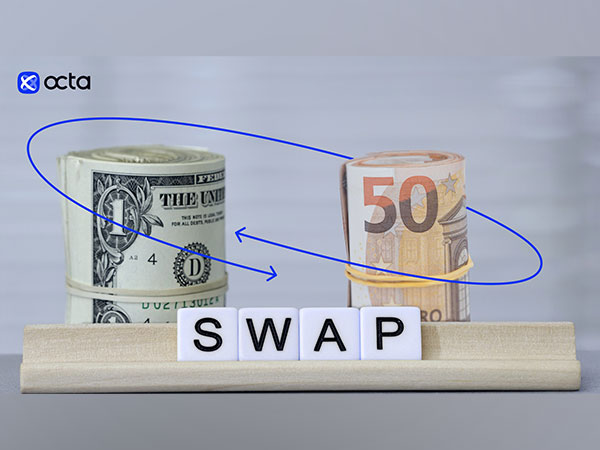Forex swap: what it is, how it is calculated, and what are swap-free accounts in Octa

One of the most misunderstood terms in Forex trading is swap or Forex swap. To trade successfully, you should understand what Forex swap depends on and how it is calculated. This article describes what a Forex swap is, explains its mechanics, and describes swap-free trading accounts.
What is a Forex swap?
Swap is a commission charged for carrying open positions overnight to the next trading day in the Forex market. The exact moment when the swap is withdrawn from your trading account depends on your broker. Most brokers charge it most often between 11 p.m. and 12 a.m. server time.
The Forex market is over-the-counter and non-deliverable, meaning you are not the owner of the trading asset. In order not to cause the need for calculations, the system automatically closes an open position on the current trading day and opens it on the next one. Such closing is considered conditional, as the position is carried over, and the swap is charged.
Depending on the value of the swap and the position, the swap can be negative or positive. In other words, you will either have to pay a commission or be paid a commission for holding an open position overnight. This is because the margin system used in Forex trading allows you to use the additional capital the broker provides. You borrow funds to open a position from your broker.
There is an opinion among traders that the Forex swap is nothing but a broker’s commission. However, this is not true. Let’s find out how swaps work in the Forex market.
How do swaps work in the Forex market?
Every time you open a position, you make two transactions: buying one and selling another currency in a currency pair. So, you are essentially borrowing that money to sell one of the currencies and need to pay interest on the borrowed amount. However, in doing so, the currency you buy will earn you interest.
If the base interest rate on the currency you buy is higher than the currency you sell, you can earn interest on the difference in rates for carrying an open position to the next day. However, given the broker’s markup, regardless of the direction of the open position (buying or selling), you will have to pay a commission.
Thus, the value of a swap depends on the market and the instrument you are trading. For example, the swap on the same EURUSD and USDJPY positions will differ.
The value of swap varies depending on:
– type of the position–Buy or Sell
– type of the asset
– number of days the position remains open
– nominal value of the position (number of lots).
Why is there a triple swap?
Sometimes, a swap is charged for holding an open position over the weekend, even if you did not have it on Saturday and Sunday. Such a fee is called a triple swap. Since the markets are closed on weekends, the triple swap was invented to compensate for this and is charged either on Fridays or Wednesdays, depending on the specific market.
This is because orders are settled on the Forex market on the second working day from the trade date (T+2). Since the value date falls on a weekend, the transfer is made for three days at once (on Monday). Therefore, from Wednesday to Thursday (at 12 a.m.), the swap is charged for the past weekend and Wednesday.
In other words, if you hold your position overnight when the triple swap is applied, your order will be charged three times the standard swap.
Are there swap-free accounts?
To make trading more convenient and accessible, many brokers have introduced the concept of swap-free accounts.
Swap-free accounts relieve the trader from the need to constantly monitor the size of accounting rates on currencies in a currency pair, make trading more straightforward, and allow taking into account in advance the commission for the transfer of positions when calculating the financial result of planned transactions. It is also relevant for those clients who cannot use swaps due to religious beliefs. This determines the second name of this type of account–Islamic accounts.
Charged daily, the swap fee accumulates over time, making trading less favourable. To enhance the investment opportunities of its customers, Octa has decided to remove swap fees for all types of trading accounts. These fees will no longer prevent traders from using medium- and long-term strategies in the financial market. Now, they can keep that position open for as long as they see fit and with no swap cost.
